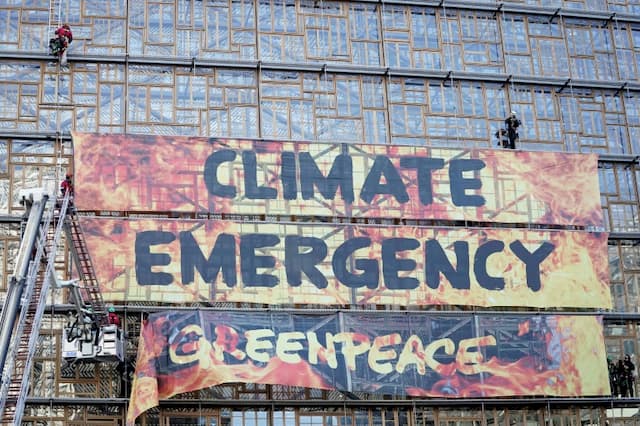European Summit: Nuclear Power Weighs Heavily in Climate Negotiations

Three Eastern European countries are demanding guarantees before committing to the “Green Pact”, which provides for EU carbon neutrality by 2050.
The nuclear issue sparked “intense” talks Thursday (December 12th, 2019) at the EU summit in Brussels , where three Eastern European countries are asking for guarantees before committing to the “Green Pact”, which provides for carbon neutrality of the EU . EU by 2050.
For its first summit, the new President of the European Council, Charles Michel , must convince Poland, the Czech Republic and Hungary, countries still highly dependent on fossil fuels, including coal.
Europeans are called to endorse this goal of climate neutrality. In the wake of the launch of Ursula von der Leyen’s flagship Ursula Commission’s “Green Pact”, a failure would be a bad thing as COP25 draws to a close.
But the company is long and difficult. “We can not agree to a model of economic transformation that would suffer Polish society,” warned Polish Prime Minister Mateusz Morawiecki from the outset.
“The cost of energy transformation in Poland is far higher” than in other countries, he said, saying that “the time to achieve carbon neutrality must vary according to the level of economic development of the countries. “.
On the Czech side, Prime Minister Andrej Babis has estimated the cost of this transition at “probably more than 30 to 40 billion” euros.
” Not possible “
To help the most “vulnerable” regions and sectors in the transition to carbon neutrality, the Commission has planned a “just transition mechanism” that can mobilize € 100 billion of investment.
Prague would like nuclear energy, which does not emit CO2, to be explicitly mentioned in the conclusions of the summit, as is Budapest.
Such recognition would have financial consequences, giving entitlement to transitional aids.
“Without nuclear power, it is not possible for the Czech Republic,” warned Mr. Babis who has attacked Austria, a country fiercely opposed to nuclear as well as Luxembourg and Germany.
“This morning, at 7:45, the Austrians have consumed 23% of Czech electricity, Slovakia 30%. If we had not provided energy to Austria, a quarter of the inhabitants could not even make a coffee, “he tweeted before the summit.
The prospect of recognizing nuclear power has strangled Luxembourg Prime Minister Xavier Bettel.
“Every country is free to choose its energy mix, but it is funded with money from the European taxpayer, no, I am not for,” he warned.
Hungarian Prime Minister Viktor Orban asserted that “without nuclear power, there is no carbon-neutral European economy”, also calling for “clear financial guarantees”.
“Moderately optimistic”
A position supported by French President Emmanuel Macron, who has ensured that nuclear “can be part of the energy mix of European countries on the road to carbon neutrality.
“Everyone must be able to build its transition to his hand,” said the head of the French state, while more than 70% of electricity produced in France is of nuclear origin.
The draft conclusions of the summit, seen by AFP, in which the EU inscribes this goal of 2050, remains open on the means to get there. He calls for “respect for the right of member states to decide on their energy mix and to choose the most appropriate technologies”.
A European source said it was “moderately optimistic” about the chances of an agreement, while talks that had been going on for more than three hours were described as “intense” by another source.
Even before the start of the summit, Greenpeace sounded the alarm about global warming with spectacular action.
Thirty NGO activists, deceiving the security of the EU Council headquarters, climbed the building, unfurled a banner on the “climate emergency” and lit smoke. The police proceeded to dozens of arrests.
The climate ambition of the new Commission, however, is linked to another thorny topic on the agenda: the budget for the period 2021-2027, which promises fierce debate.
Charles Michel must bring the points of view between the countries, dissatisfied with the proposal put on the table by the Finnish EU presidency, a budget supplemented by national contributions of 1087 billion euros, or 1.07% European gross national income. Against 1.114% proposed by the Commission and 1.3% by the Parliament.
EU leaders are also looking to the United Kingdom where the British voted Thursday.
The result of the legislative elections will be decisive for the future of the agreement negotiated between London and the EU, which provides for divorce on the 31st January.
Irish Prime Minister Leo Varadkar, whose country is particularly exposed to the consequences of Brexit, wanted a “clear result”.
The post-divorce will be discussed Friday with discussions on the future commercial relationship between London and the 27.
Enjoyed this? Get the week’s top France stories
One email every Sunday. Unsubscribe anytime.


